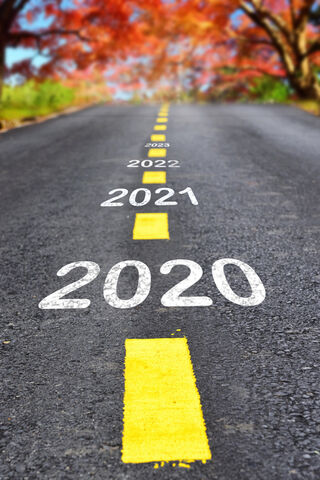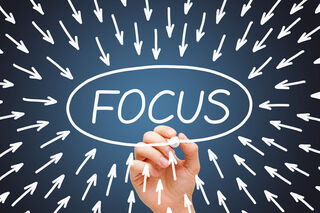Attention
ADHD and Focus
How to improve flow and attention in a distracted 2021 COVID world.
Posted January 5, 2021

Even though it's 2021, not much seems that different than a week ago. The COVID-19 pandemic continues to change all of our lives in ways we could never have imagined a year ago.
For older teens and young adults, the markers of how you’ve defined yourself—school, music, sports, friends, parties, work—have shifted dramatically in 2020. In fact, it’s probably difficult to imagine how and when these beloved parts of your lives will actually return. It’s been disorienting, disappointing and isolating to say the least. Many young people with ADHD have been struggling to make it through, avoid depression and get basic stuff done. Amidst increased anxiety and constant access to technology, it’s harder than ever to find focus and stay attentive. If you feel more distracted than ever, you are certainly not alone.
What is focus? Focus is a dynamic process of choosing what is important to notice, do or recall. Focus is the spotlight of your attention and how you direct it. Stress, worry and sadness negatively affect the ability to concentrate and persist with activities. Focus is affected by many things including a loss of familiar routines (where and when you do things) and predictability (how and why you do). Human brains, especially those with ADHD, benefit from these habits. The many disruptions of the pandemic have upended the practices that helped you get through each day and manage new situations before COVID-19 with a sense of clarity and security. They have affected your executive functioning skills on many levels and particularly the ability to maintain your attention in both desired and unpleasant tasks.

Focus is affected by many things including a loss of familiar routines (where and when you do stuff) and predictability (how and why you do things). There are four types of focus:
- Selecting: Choosing where to put your attention.
- Monitoring: Noticing where your attention is and where it is not.
- Shifting: Actively bringing your attention back to the task at hand or moving it elsewhere.
- Hyper-Focus: Intense concentration so that you lose track of time and place.
People with ADHD often face challenges in several of these categories simultaneously. You benefit from any daily routines because these structures help you prepare for and adapt to what’s coming. The routines fill in the gaps where your working memory may lapse. The many disruptions of the pandemic have upended whatever practices previously assisted you to get through each day and manage new situations with a sense of confidence and competence. Your focus is more limited and your attention wanders often.
Sustained attention—sticking with what you are doing and staying on task—is a key component of focus. It's the sense of "flow" most of us feel when we are chugging along at doing something. Most folks with ADHD don’t notice when they drift off but rather when they return from losing the focus of their attention. You need a plan for how to cope when you come back instead of feeling flustered and embarrassed. This means learning to be more mindful about what distracts you and so you can be more intentional about what you do when it’s over.
One of my clients, Aliyah, age 17, disliked her English class and the teacher. She would, in her own words, “space out all the time and then when he calls on me, I look stupid even though I’m not. I just don’t like to read.” We talked about what might help her stay interested in class by naming when she’s bored. I asked her to write down her favorite distractions. The next week, she waved a piece of paper at me: “Here it is, my F-box: things that F-ing distract me in that stupid F-ing class.” Now we had a place to begin. Once you know what distracts you, you can create interventions for catching up without feeling overwhelmed or ashamed.
Although a lot of teens and young adults with ADHD don’t like lists or calendars, many have confided in me that they do see the benefits of using them as a way to organize and remember things. It’s the same thing with my “Coming Back Confidently Program.” You may not like it at first but it will help you adapt better to your wandering attention. When you develop more awareness about what takes you off your focus, you’ll learn how to bring yourself back to the task at hand more effectively.

Follow these tips:
- Be kind to yourself: Practice self-compassion. You’ve got to start with this. It doesn’t help to put yourself down because you struggle with focus and sustained attention. That’s a natural part of having ADHD. So put your negative self-talk aside and stick with curiosity. This will lead towards learning effective skills and better self-esteem. This is a time to adjust your expectations for yourself to what's possible in pandemic living, not pre-pandemic standards.
- Consider the successes and the challenges: In order to understand how you lose your focus, you have to start with when you easily maintain it. Set aside 15 minutes in a quiet setting for this exercise. First, ask yourself: “What do I really like to do that’s easy for me to pay attention to? What does it feel like when I’m in the flow?” Next, ponder: “When do I tend to lose my focus and drift off? What do I think about when this happens? Is there a pattern to this?” Thirdly, reflect on when you return from your attention break: “How do you cope and what do you do? How would you prefer to respond?” Write down your answers.
- Make connections: Pick one challenge with your focus and one ideal response. Think about creating an alternative behavior and a phrase or two that will buy you some time when you return from an interruption in your attention. Consider something like: “That’s a good question. Hmm.” Or, “Can I have a minute to think about this and get back to you?” Then, gather your thoughts quickly and say what’s on your mind.
- Manage hyper-focus: While hyper-focus can result in high productivity, it also raises stress levels in your brain and gobbles up critical energy for thinking. Set your timer on your phone so you take a short break to go to the bathroom or get a snack to keep yourself going. Make a note of what was happening when you stopped so you know what exactly to do when you get back.
- Limit your technology: When you are actively trying to get something done, block your access to certain sites and turn off notifications from social media or gaming apps. Either set a timer and check these once an hour during your short break or wait until you meet a goal you've set for your work, chore, etc.


